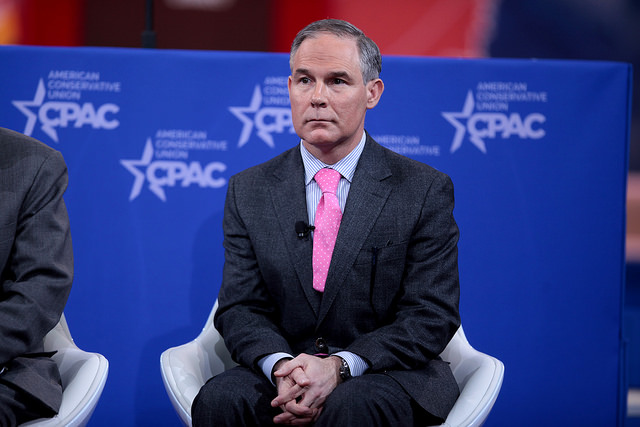By Noa Dalzell, political columnist
“Today, there is no greater threat to our planet than climate change,” former President Barack Obama said in August. “If another country threatened to wipe out an American town, we’d do everything in our power to protect ourselves. Climate change poses the same threat right now.”
Scientific evidence for climate change is unequivocal, with 97 percent of the scientific community maintaining that its primary cause is human activity. Greenhouse gases, produced when coal, oil and natural gas are burned to generate energy for electricity, heat, industry and transportation, have detrimental effects as the sun’s radiation is trapped by pollutants in the atmosphere. Acid rain has emerged as an unfortunate phenomenon, with polluted rivers and lakes destroying farms, crops and even buildings. Increased air pollution has caused severe respiratory problems, particularly in densely populated, developing places such as New Delhi. Clean air and water have grown scarce in many regions of the world.
Experts predict that there will be a significant loss of wildlife, with a quarter of the world’s species extinct by 2050 if global warming continues at its current rate. Glaciers are retreating almost everywhere around the world, including the Alps, Himalayas, Andes and Rockies. While much damage has already been done, the situation is expected to worsen unless significant action is taken.
Scientists fear climate effects will be so severe that they could potentially destabilize governments with overwhelming waves of environmental refugees and melt the polar ice caps, causing the seas to rise high enough to flood most of the world’s coastal cities. Preventing the potentially dire consequences of climate change from coming to fruition will require large, systemic cuts in greenhouse gas emissions and strong leadership from the United States.
Scott Pruitt to head the EPA
In December, President Donald J. Trump took an important step in establishing his stance on climate change by selecting Scott Pruitt to be administrator of the Environmental Protection Agency (EPA). Established under President Richard Nixon in 1970, the federal agency aims to protect human and environmental health while regulating the manufacturing, processing, distribution and usage of chemicals and pollutants.
Pruitt, meanwhile, has been an avid denier of the realities of climate change. He has served as attorney general of Oklahoma since 2010, emerging as a fierce opposer of EPA policies. In an exchange with Sen. Bernie Sanders (I-Vt.) on Jan. 8, Pruitt said that his “personal opinion was immaterial” to him serving as head of the EPA. His record is not, however—and it raises important red flags.
Pruitt has described climate change as a topic up for debate. In The National Review earlier this year, he falsely claimed that “scientists continue to disagree about the degree and extent of global warming and its connection to the actions of mankind.” In reality, there has been almost unanimous consensus from the scientific community.
In addition, Pruitt was one of the leading state attorneys general responsible for suing the EPA in order to block the Clean Power Plan, a groundbreaking policy that was the first of its kind to set limits on carbon pollutants from power plants. Pruitt has sued the EPA 13 times, and climate change deniers have praised the pick and called Pruitt the “ideal candidate to lead the EPA.” In his own LinkedIn biography, Pruitt describes himself as “a leading advocate against the EPA’s activist agenda.” Michael Brune, executive director of the Sierra Club, likened Pruitt’s nomination to “putting an arsonist in charge of fighting fires.”
This appointment shouldn’t have really come as a surprise to anyone, as Trump famously deemed climate change a “hoax created by and for the Chinese” and said he planned to dismantle the EPA. But hope is a defining characteristic of our nation, as the Obamas maintained in the the wake of Trump’s inauguration. Many were hopeful that Trump would select someone who will fight to preserve the world we live in, but his appointment of Pruitt to head the EPA goes along with his rhetoric. It was only an ill-advised tweet—until it wasn’t.
With Pruitt’s appointment, Trump has sent his message loud and clear: The environment is not a pressing concern, and America will not take a leadership role in minimizing the detrimental effects of climate change.
One of the things that news outlets and environmental advocates overlook when analyzing America’s potentially concerning environmental policies is the notion of historical accountability. Between 1850 and 2007, the U.S. was responsible for 28.8 percent of the world’s fossil fuel emissions. America’s continued industrialization and environmental exploitation sustains the contamination and depletion of the environment while unfairly limiting the industrialization of the the so-called global South, developing countries that are not responsible for climate change.
We are to blame for the current state of our planet, not India. It is crucial that Trump’s administration recognizes this. Ignoring historical accountability privileges people that live in developed countries and discriminates against people that live in countries that have yet to develop.
Last year was the third year in a row to shatter global temperature records. This is no longer something we can deny or ignore. While we eagerly wait to watch the reality show that is Trump’s administration play out, do your part to minimize the effects of climate change. The EPA (before Pruitt, that is) lists some things you can do in your everyday life to help the environment. In addition, you can fill out this easy form to urge your senator to oppose Pruitt’s nomination. It is important that as constituents, we recognize the power that we have, even in the most difficult of times.
Photo courtesy Gage Skidmore, Creative Commons









